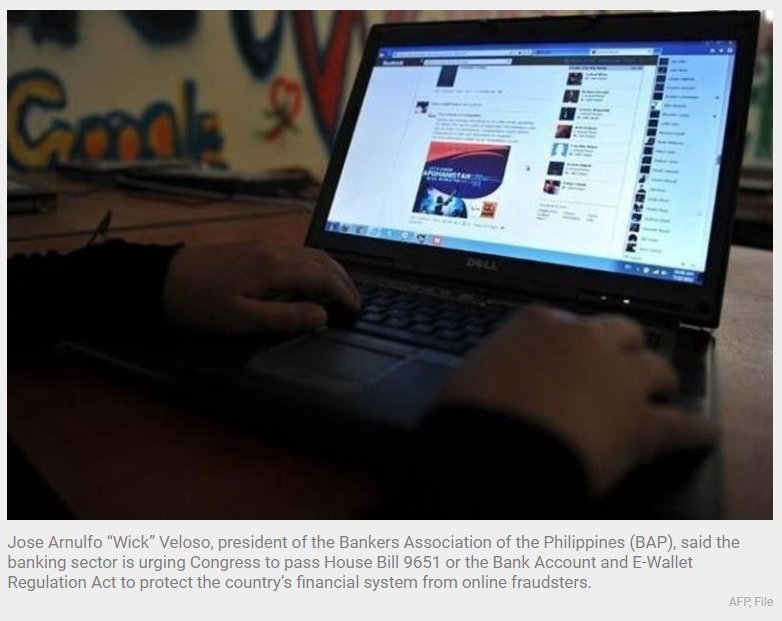Philippines: Banks want stiffer sanctions vs cybercriminals
MANILA, Philippines — Banks are pushing for stiffer sanctions against cybercriminals amid the sharp increase in online fraud as more Filipinos embrace digitalization due to mobility restrictions brought about by the pandemic.
Jose Arnulfo “Wick” Veloso, president of the Bankers Association of the Philippines (BAP), said the banking sector is urging Congress to pass House Bill 9651 or the Bank Account and E-Wallet Regulation Act to protect the country’s financial system from online fraudsters.
“There has been a rise in the number of cybercrimes perpetrated against the banking public, thus there is a need to ensure that criminals are held accountable for what they have done,” he said.
Veloso, who is also president and chief executive officer of Philippine National Bank (PNB), said the bill would expand the government’s tools to fight cybercriminals by punishing the use of financial accounts for criminal activities.
The bill aims to punish major offenses such as money mules and phishing as a form of economic sabotage.
A money mule is defined as a person who electronically receives, acquires and transfers money, funds and proceeds derived from phishing or other cybercrimes.
On the other hand, phishing is defined as a social engineering scheme or any attempt to obtain sensitive identifying information by disguising as a trusted entity in an electronic communication for the purpose of illegally accessing a a victim’s online account.
Sanctions under the proposed law include a prison term of six to 12 years or a fine of P200,000 to P500,000. Persons who are found aiding a money mule or attempting major offenses face a jail term of six months to six years or a fine of P100,000 to P200,000.
Veloso said the BAP would continue to work with Congress on the proposed amendments on the bill.
“We welcome opportunities to provide inputs to our legislators as to how we can further strengthen this bill. The BAP is willing to work with the necessary stakeholders to ensure the safety of every Filipino who conducts financial transactions online,” he said.
The Philippines was included in the gray list or jurisdictions under increased monitoring after failing to address strategic deficiencies in regimes to counter money laundering, terrorist financing and proliferation financing of Paris-based global dirty money watchdog Financial Action Task Force (FATF).
Bangko Sentral ng Pilipinas Governor and Anti-Money Laundering Council chairman Benjamin Diokno is confident the Philippines will be removed from the gray list on or before January 2023.
“The Philippines swiftly acted on the concerns raised in the report and took a whole of government approach in addressing the issues. We have completed our key commitments and continue to do so in the midst of our fight against the ill effects of the pandemic,” Diokno said during an event organized by the Bankers Institute of the Philippines Inc.
The BSP chief said authorities remain steadfast and committed to implement initiatives aimed at further strengthening the banking system’s framework and defenses against money laundering, terrorist financing and proliferation financing risks.
“If we as a nation fail to institute the recommended measures, this may potentially increase the cost of doing business with Filipinos, as regulators and financial institutions add another layer of scrutiny on our transactions,” he said.
Source: https://www.philstar.com/business/2021/08/26/2122607/banks-want-stiffer-sanctions-vs-cybercriminals


 Thailand
Thailand




